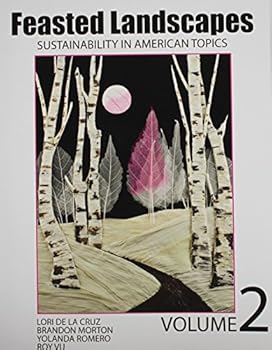Feasted Landscapes: Sustainability in American Topics Volume 2
Proceeding the Civil War, it's a brave, new world... again. Westward expansion reshapes the American west and John Wesley Powell addresses the needs to sustain western agriculture in the West in his Report on the Lands of the Arid Region. Booker T. Washington preaches the significance of industrial and agricultural training of African Americans in the South and Jane Addams spearheads changes to garbage collection in Chicago. The Industrial Revolution ushers in the Gilded Age which further illustrates, rather starkly, the ever-widening disparity in wealth as immigrants flow into America seeking a better life. At the same time, conservationist John Muir pushes for the establishment of Yosemite National Park and parks for the Grand Canyon and the Sequoia region of California, while the Forest Management Act of 1905 emphasizes the harvesting of forests to expand agricultural development, to feed the industrial machine and to provide timber for construction. In the 20th century, sustainability takes a beating as the Industrial Revolution becomes the status quo. After the Civil War, our nation set about the process of healing, bringing us together through exploration, innovation and exploitation of resources. We waged and won wars at great cost, environmentally, economically and socially. The development of synthetic fertilizer, by Fritz Haber during the first World War, staved off hunger in Germany until late in the war. It also provided the materials for use in explosives and poison gas. Today it alters the world's soil with colossal effects as industrial farming relies more heavily on synthetically replacing nutrients necessary for plant growth. After World War II, the US experienced a surge in prosperity that spawned suburbs, automobiles, hula-hoops and later, fast-food drive-thrus. The economy exploded as houses, cars and shopping malls grew. Disposables became a way of life as repairing this and that became a cliche. Toxic pollution was just proof of progress, until Rachel Carson's ground-breaking book, Silent Spring. Her treatise on the common pesticide DDT started an environmental movement that awakened the American public to the environmental dangers lurking all around them, propagated by a voracious appetite for bigger profits. And it helped push the federal government into action with the development of the Environmental Protection Agency and legislation such as the Clean Drinking Water Act, Clean Air Act, Marine Mammal Protection Act, and the Endangered Species Act. Thanks to activists and the Internet, we are now more aware of the problems that face our nation and global society. From the resettlement of Vietnamese refugees to the disenfranchised Mexican migrant worker; from Bangladeshi textile sweatshop workers to pollution-choked residents of Beijing, China; we can learn from our past and create a better future. But climate change is going to be the crucial test of learning from our past to change our future. During the next thirty to fifty years, we will have to take environmental resilience, economic responsibility and social justice into account every single day, in every decision we make. "
Format:Paperback
Language:English
ISBN:1465274022
ISBN13:9781465274021
Release Date:August 2015
Publisher:Kendall Hunt Publishing
Weight:1.05 lbs.
Related Subjects
NatureCustomer Reviews
0 rating





